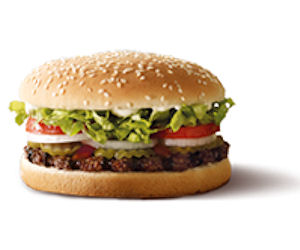
The investments are better at Hungry Jacks
On occasion, I Google Warren Buffett and see what the 84-year-old Oracle of Omaha has been up to. Most recently, he participated in a venture with Hungry Jacks (overseas; Burger King) and I thought it worth sharing a few words.
In short, Berkshire Hathaway Inc. will provide US$3 billion to Burger King Worldwide Incorporated (NYSE: BKW) to finance its purchase of the chain of Tim Horton, a doughnut confectioner located in Canada. In exchange, Berkshire will receive 30,000 BKW-preferred stock that pays a 9 per cent coupon as well as an undisclosed figure of warrants (warrants are like options, but instead of them being executed on the market the company will issue new shares instead).
Interestingly, 3G Capital – whom Buffett previously worked with in its acquisition of H.J. Heinz Company – also owns a controlling stake in BKW. In total the acquisition of Tim Horton’s will cost BWK $US11 billion and will make it the third largest food company in the world.
Of course, Buffett tends to target a ‘sure thing’ 15 per cent and of course, and the 9 per cent coupon payment is well behind this target. So where will the additional value come from?
Many note that the acquisition allows BWK to domicile in Canada for tax purposes, bringing its effective tax rate down from 27.5 per cent to 26.5 per cent . Whilst there has been a great deal of controversy on the ethics of these type deals, the tax saving would have only increased BKW’s FY13 NPAT from $233.7 million to $236.9 million.
The question I think comes down to the value of those warrants which Buffett can convert into a 1.75 per cent stake in BKW, which (post-transaction) would be the third largest food company in the world.
This post was contributed by a representative of Montgomery Investment Management Pty Limited (AFSL No. 354564). The principal purpose of this post is to provide factual information and not provide financial product advice. Additionally, the information provided is not intended to provide any recommendation or opinion about any financial product. Any commentary and statements of opinion however may contain general advice only that is prepared without taking into account your personal objectives, financial circumstances or needs. Because of this, before acting on any of the information provided, you should always consider its appropriateness in light of your personal objectives, financial circumstances and needs and should consider seeking independent advice from a financial advisor if necessary before making any decisions. This post specifically excludes personal advice.
INVEST WITH MONTGOMERY
Nick Dragovic
:
Hi Scott
A very interesting article I read last night which gives some insight into the motivations of Berkshire in regards to the Burger King deal, I think the author has a point with deferred taxes being in effect interest free loans which companies then use to generate more profit where taxes will be deferred again. I did a double check myself and Berkshire Hathaway AR shows deferred tax liabilities going up from $44bn to $57bn from 2012 to 2013. It’s a staggering amount. I think that might be one of the moats that Buffet might have been thinking off.
http://www.newsweek.com/corporate-deadbeats-how-companies-get-rich-taxes-268303
Cheers,
Nick
Roger Montgomery
:
Yes. My only question is whether there is value in the idea of growing a pile of money that is never accessed?
Andrew Legget
:
Warren seems to like his preferred investment opportunities. I wonder whether Warren is suffering from a similar thing as the rest of us where opportunities are a little thin on the ground. There for the 9% dividend yield is an alternative to investing in cash.